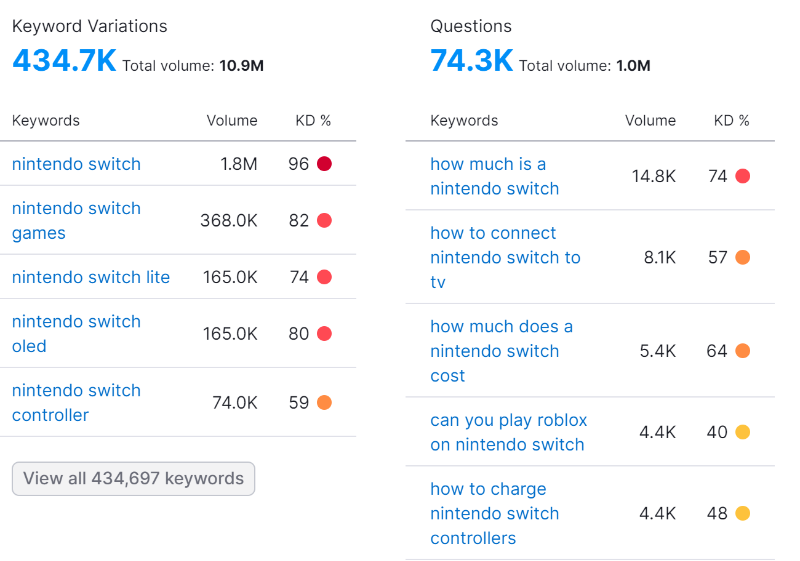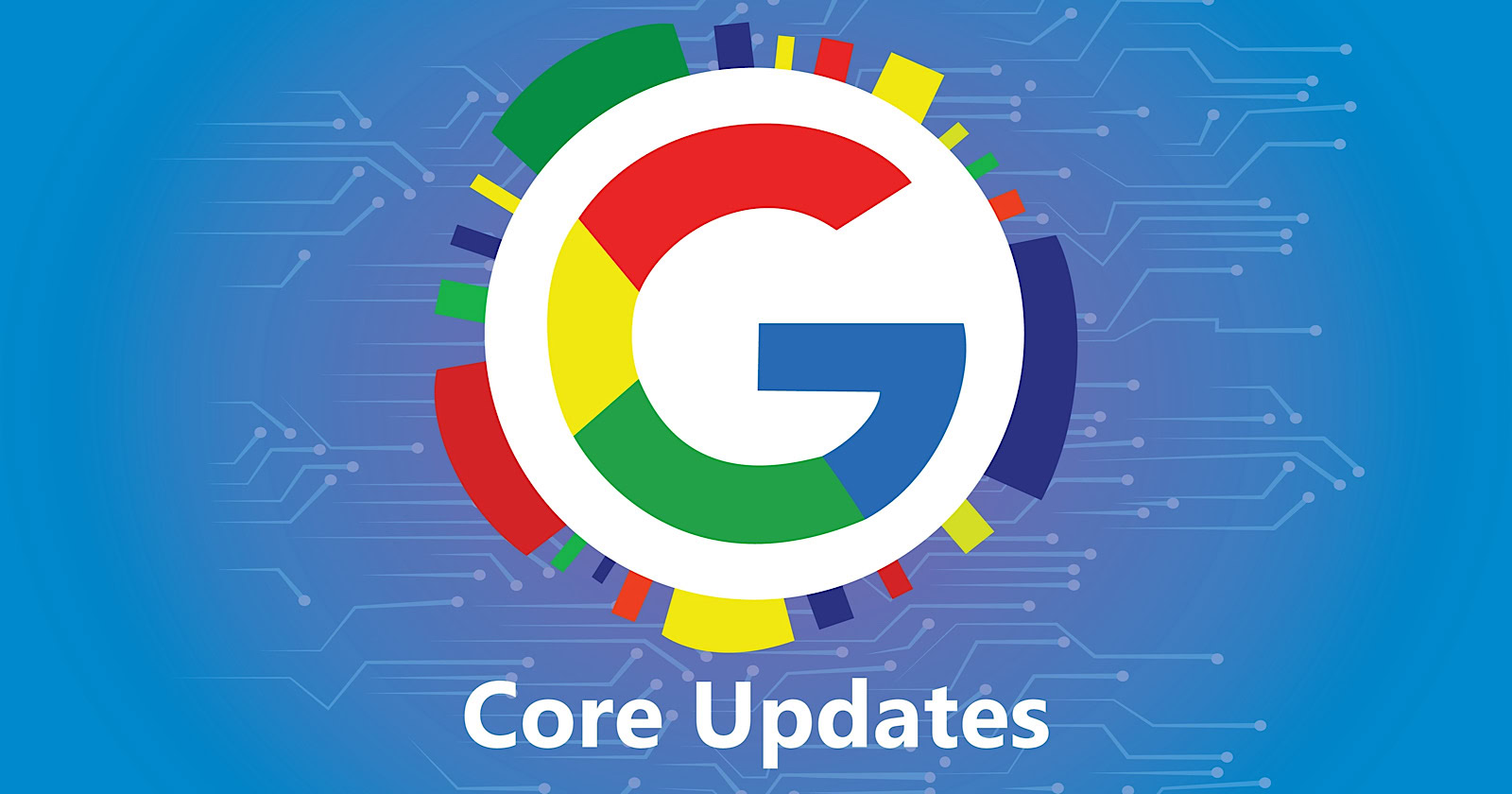SEO
Do Keywords Still Matter?

Are keywords still important today?
Keywords – ranging from single words to complex phrases – are still instrumental in shaping website content to boost relevant organic search traffic and essential tools for connecting the target audience with your website.
But just how much? Let’s explore.
There is no short answer to this. If you ask whether keywords in queries are essential to provide a list of relevant files to satisfy an informational need, then the answer is no.
But if you ask if keywords matter to Google’s indexing and retrieval system, the answer is absolutely yes.
Let’s take a closer look.
Why Keywords Matter In SEO
Keywords are the key phrases commonly used by consumers to find what they are looking for online.
They use the search bar in their browser to type in the terms, which are usually made of one or more words that describe what they want.
There are many types of keywords, including:
- Branded.
- Non-Branded.
- Local and Global.
- Brand + Geography.
- Brand + Product, etc.
Here are four ways keywords continue to help brands.
1. Keywords Help Indicate User Intent
Keywords are directional. They give very good clues that “point” to the kind of content the searcher is trying to retrieve.
However, there is still a vocabulary problem between the index system and end users, who have many different ways to ask for the same thing or something similar.
This is why Google and other search engines have extremely advanced query expansion technologies.
For example, an end user typing “solar energy” as a query may well see the first result for solar power, which may be more relevant and useful to satisfy the informational need than another page that only has a direct match to the words “solar” + “energy” to qualify it.
Plus, timestamps appended to keywords in the index for temporal analysis give a clue to freshness to help detect trends, and then there has to be event detection for news results.
And so much more.
So, yes, the closer a user can get the query to match the relevant content, the better.
However, users tend not to know what they’re looking for (if they did, they wouldn’t need a search engine), so search engines must be sophisticated with definition and association discovery.
2. Keywords Help Find Quick Wins
Finding quick wins or striking distance opportunities, especially for keywords that bring in conversions for other channels, should be your quickest path to improving organic visibility.
For example, if you’re a large-scale retailer like Walmart and you’re ranking in position 13 for Nintendo Switch, which has millions of searches per month, that would be on my priority list to optimize.
I would examine and optimize the landing page, internal and external links, etc., to see what you need to do to get this term on the first page of Google to drive more sales and revenue.

3. Keywords Help Identify The Right Target Audience
When we perform competitive analysis and look at keyword visibility for a prospect or current client versus the competitive set, we can uncover a content gap.
We could find they don’t have content related to that topic or that the content they have is not ranking or optimized.
For example, I previously had a financial client who wanted to rank for “Tesla Loans.”
After looking at competitor visibility, we noticed competitors ranked for “Tesla Financing,” and my client did not have “Tesla Financing” in their page title, headings, body content, etc., and therefore did not rank for the term.
But loans and financing are not synonymous.
Once we developed content for “Tesla Financing” instead and optimized it, marked it up with schema, built content around it, did some internal linking, promoted the content, etc., conversion rates increased by 15% YOY.
The keyword “Tesla Financing” helped us identify the proper target audience that had a much higher search volume than Tesla Loans.
 Screenshot from author, December 2023
Screenshot from author, December 2023
4. Keywords Help Drive Traffic
Most traffic occurs on page one of Google. In fact, the top result alone takes 28.5% of the clicks.
If you increase visibility into the first page, your site can drive a considerable amount of incremental traffic, which can potentially lift sales on keywords that have high volume.
Having a top position on a low-volume keyword is not meaningful.
Instead, focus your efforts on keywords that drive business value and have some volume and holistic content that answers questions end users will find useful.
Far too many clients and articles focus on counting keyword success stories instead of measuring the impact of those successes (or not).
Should We Still Track Keywords?
The answer here is an overwhelming yes. Keywords still provide value by delivering traffic, conversions, visibility, and sales in prime positions.
For enterprise-level brands with a lot of products and services, it can be expensive to track keywords because there can be thousands or millions of keywords to monitor across desktop and mobile.
It’s a great idea to keep a golden keyword list of terms that deliver the most business value to your brand, i.e., traffic, revenue, and conversions, and a mixture of non-brand, brand, and product keywords that are vital to your first-page visibility.
A brand wants to know what its highest volume terms are doing and get as much traffic as possible from those keywords.
It makes sense to track a few hundred keywords per core business line and region for enterprise-level brands.
Tips For Finding The Right Keywords
Before you start using a wide variety of keyword research tools, always think like a customer and ask, “What is the purpose of my website and what problem am I going to help end users solve and satisfy their information need?”
If you can answer that question, you are on the right path to defining your audience and your content and keyword strategy.
One of the keyword research data sources I like to use is paid search data if it is available. If you have historical paid search data, you can see which keywords resulted in conversions and sales, which can help define what content you should create.
Additionally, you can use tools like Google Keyword Planner, KW Finder, Moz Keyword Explorer, Semrush, Ahrefs, and Long Tail Pro, offering diverse functionalities to aid in finding the right keywords.
At the end of the day, SEO is all about delivering qualified traffic that converts into customers. If your site is receiving a lot of traffic and no one converts, what is the point?
(Unless, of course, you have a site that depends on ad revenue, affiliate traffic, or any other advertising model.)
When Keywords Are Actually Useless
Some SEO pros are still focusing on keyword density. News flash: Keyword density does not matter.
Stop trying to stuff keywords into content – it won’t help you get higher rankings if you have your primary keyword at 10% KD, etc.
Focus on writing content that will satisfy the informational need and give users what they want.
I also still see sites using the keyword meta tags. Google devalued that a long time ago, and it has no ranking value and won’t move the needle.
Lastly, using exact match anchor text for all your links is not a good idea. Anchor text should be a mixture of brand and non-brand with different keyword variations.
Google is sophisticated, and if you have too many keywords with exact match anchor text links, you can send off an alarm, and your site can potentially get penalized.
Wrapping Up
While the landscape of SEO and the role of keywords have undergone significant changes, especially with the advent of AI and NLP technologies, keywords remain a crucial element of SEO strategies.
Their proper usage and understanding are integral to connecting with the target audience, understanding market needs, and ultimately driving traffic and conversions.
Always focus on the user experience and E-E-A-T as Google’s focus on providing valuable, relevant content to users has led to the emergence of E-E-A-T (Expertise, Experience, Authoritativeness, and Trustworthiness) as a key ranking signal.
Creating content that genuinely addresses user queries and demonstrates first-hand experience is crucial.
The evolution of SEO practices towards a more holistic, user-centric approach underscores the need to stay updated with the latest trends and tools to maintain effective online visibility.
More resources:
Featured Image: Red Deer/Shutterstock
SEO
Google March 2024 Core Update Officially Completed A Week Ago

Google has officially completed its March 2024 Core Update, ending over a month of ranking volatility across the web.
However, Google didn’t confirm the rollout’s conclusion on its data anomaly page until April 26—a whole week after the update was completed on April 19.
Many in the SEO community had been speculating for days about whether the turbulent update had wrapped up.
The delayed transparency exemplifies Google’s communication issues with publishers and the need for clarity during core updates
Google March 2024 Core Update Timeline & Status
First announced on March 5, the core algorithm update is complete as of April 19. It took 45 days to complete.
Unlike more routine core refreshes, Google warned this one was more complex.
Google’s documentation reads:
“As this is a complex update, the rollout may take up to a month. It’s likely there will be more fluctuations in rankings than with a regular core update, as different systems get fully updated and reinforce each other.”
The aftershocks were tangible, with some websites reporting losses of over 60% of their organic search traffic, according to data from industry observers.
The ripple effects also led to the deindexing of hundreds of sites that were allegedly violating Google’s guidelines.
Addressing Manipulation Attempts
In its official guidance, Google highlighted the criteria it looks for when targeting link spam and manipulation attempts:
- Creating “low-value content” purely to garner manipulative links and inflate rankings.
- Links intended to boost sites’ rankings artificially, including manipulative outgoing links.
- The “repurposing” of expired domains with radically different content to game search visibility.
The updated guidelines warn:
“Any links that are intended to manipulate rankings in Google Search results may be considered link spam. This includes any behavior that manipulates links to your site or outgoing links from your site.”
John Mueller, a Search Advocate at Google, responded to the turbulence by advising publishers not to make rash changes while the core update was ongoing.
However, he suggested sites could proactively fix issues like unnatural paid links.
“If you have noticed things that are worth improving on your site, I’d go ahead and get things done. The idea is not to make changes just for search engines, right? Your users will be happy if you can make things better even if search engines haven’t updated their view of your site yet.”
Emphasizing Quality Over Links
The core update made notable changes to how Google ranks websites.
Most significantly, Google reduced the importance of links in determining a website’s ranking.
In contrast to the description of links as “an important factor in determining relevancy,” Google’s updated spam policies stripped away the “important” designation, simply calling links “a factor.”
This change aligns with Google’s Gary Illyes’ statements that links aren’t among the top three most influential ranking signals.
Instead, Google is giving more weight to quality, credibility, and substantive content.
Consequently, long-running campaigns favoring low-quality link acquisition and keyword optimizations have been demoted.
With the update complete, SEOs and publishers are left to audit their strategies and websites to ensure alignment with Google’s new perspective on ranking.
Core Update Feedback
Google has opened a ranking feedback form related to this core update.
You can use this form until May 31 to provide feedback to Google’s Search team about any issues noticed after the core update.
While the feedback provided won’t be used to make changes for specific queries or websites, Google says it may help inform general improvements to its search ranking systems for future updates.
Google also updated its help documentation on “Debugging drops in Google Search traffic” to help people understand ranking changes after a core update.
Featured Image: Rohit-Tripathi/Shutterstock
FAQ
After the update, what steps should websites take to align with Google’s new ranking criteria?
After Google’s March 2024 Core Update, websites should:
- Improve the quality, trustworthiness, and depth of their website content.
- Stop heavily focusing on getting as many links as possible and prioritize relevant, high-quality links instead.
- Fix any shady or spam-like SEO tactics on their sites.
- Carefully review their SEO strategies to ensure they follow Google’s new guidelines.
SEO
Google Declares It The “Gemini Era” As Revenue Grows 15%

Alphabet Inc., Google’s parent company, announced its first quarter 2024 financial results today.
While Google reported double-digit growth in key revenue areas, the focus was on its AI developments, dubbed the “Gemini era” by CEO Sundar Pichai.
The Numbers: 15% Revenue Growth, Operating Margins Expand
Alphabet reported Q1 revenues of $80.5 billion, a 15% increase year-over-year, exceeding Wall Street’s projections.
Net income was $23.7 billion, with diluted earnings per share of $1.89. Operating margins expanded to 32%, up from 25% in the prior year.
Ruth Porat, Alphabet’s President and CFO, stated:
“Our strong financial results reflect revenue strength across the company and ongoing efforts to durably reengineer our cost base.”
Google’s core advertising units, such as Search and YouTube, drove growth. Google advertising revenues hit $61.7 billion for the quarter.
The Cloud division also maintained momentum, with revenues of $9.6 billion, up 28% year-over-year.
Pichai highlighted that YouTube and Cloud are expected to exit 2024 at a combined $100 billion annual revenue run rate.
Generative AI Integration in Search
Google experimented with AI-powered features in Search Labs before recently introducing AI overviews into the main search results page.
Regarding the gradual rollout, Pichai states:
“We are being measured in how we do this, focusing on areas where gen AI can improve the Search experience, while also prioritizing traffic to websites and merchants.”
Pichai reports that Google’s generative AI features have answered over a billion queries already:
“We’ve already served billions of queries with our generative AI features. It’s enabling people to access new information, to ask questions in new ways, and to ask more complex questions.”
Google reports increased Search usage and user satisfaction among those interacting with the new AI overview results.
The company also highlighted its “Circle to Search” feature on Android, which allows users to circle objects on their screen or in videos to get instant AI-powered answers via Google Lens.
Reorganizing For The “Gemini Era”
As part of the AI roadmap, Alphabet is consolidating all teams building AI models under the Google DeepMind umbrella.
Pichai revealed that, through hardware and software improvements, the company has reduced machine costs associated with its generative AI search results by 80% over the past year.
He states:
“Our data centers are some of the most high-performing, secure, reliable and efficient in the world. We’ve developed new AI models and algorithms that are more than one hundred times more efficient than they were 18 months ago.
How Will Google Make Money With AI?
Alphabet sees opportunities to monetize AI through its advertising products, Cloud offerings, and subscription services.
Google is integrating Gemini into ad products like Performance Max. The company’s Cloud division is bringing “the best of Google AI” to enterprise customers worldwide.
Google One, the company’s subscription service, surpassed 100 million paid subscribers in Q1 and introduced a new premium plan featuring advanced generative AI capabilities powered by Gemini models.
Future Outlook
Pichai outlined six key advantages positioning Alphabet to lead the “next wave of AI innovation”:
- Research leadership in AI breakthroughs like the multimodal Gemini model
- Robust AI infrastructure and custom TPU chips
- Integrating generative AI into Search to enhance the user experience
- A global product footprint reaching billions
- Streamlined teams and improved execution velocity
- Multiple revenue streams to monetize AI through advertising and cloud
With upcoming events like Google I/O and Google Marketing Live, the company is expected to share further updates on its AI initiatives and product roadmap.
Featured Image: Sergei Elagin/Shutterstock
SEO
brightonSEO Live Blog

Hello everyone. It’s April again, so I’m back in Brighton for another two days of Being the introvert I am, my idea of fun isn’t hanging around our booth all day explaining we’ve run out of t-shirts (seriously, you need to be fast if you want swag!). So I decided to do something useful and live-blog the event instead.
Follow below for talk takeaways and (very) mildly humorous commentary. sun, sea, and SEO!
-
SEARCHENGINES7 days ago
Daily Search Forum Recap: April 19, 2024
-

 WORDPRESS7 days ago
WORDPRESS7 days ago7 Best WooCommerce Points and Rewards Plugins (Free & Paid)
-

 MARKETING7 days ago
MARKETING7 days agoBattling for Attention in the 2024 Election Year Media Frenzy
-

 WORDPRESS6 days ago
WORDPRESS6 days ago13 Best HubSpot Alternatives for 2024 (Free + Paid)
-

 MARKETING6 days ago
MARKETING6 days agoAdvertising in local markets: A playbook for success
-

 SEO7 days ago
SEO7 days agoGoogle Answers Whether Having Two Sites Affects Rankings
-

 SEARCHENGINES6 days ago
SEARCHENGINES6 days agoGoogle Core Update Flux, AdSense Ad Intent, California Link Tax & More
-

 AFFILIATE MARKETING7 days ago
AFFILIATE MARKETING7 days agoGrab Microsoft Project Professional 2021 for $20 During This Flash Sale




![The Current State of Google’s Search Generative Experience [What It Means for SEO in 2024] person typing on laptop with](https://articles.entireweb.com/wp-content/uploads/2024/04/The-Current-State-of-Googles-Search-Generative-Experience-What-It.webp-400x240.webp)
![The Current State of Google’s Search Generative Experience [What It Means for SEO in 2024] person typing on laptop with](https://articles.entireweb.com/wp-content/uploads/2024/04/The-Current-State-of-Googles-Search-Generative-Experience-What-It.webp-80x80.webp)









